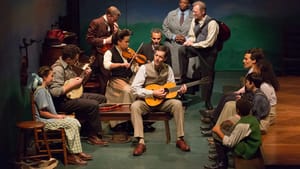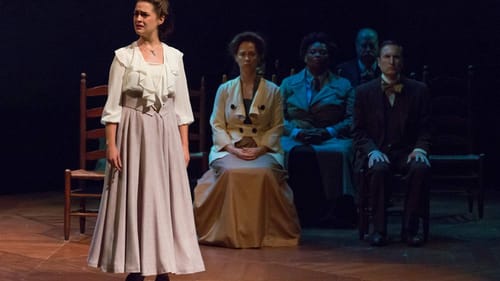Stay in the Loop
BSR publishes on a weekly schedule, with an email newsletter every Wednesday and Thursday morning. There’s no paywall, and subscribing is always free.
The universe at home
People’s Light presents Thornton Wilder’s ‘Our Town’

You always hope for a transcendent retelling of Our Town, Thornton Wilder’s plangent everyperson portrait of fictional Grover’s Corners, New Hampshire. But to close People’s Light’s 44th season, director Abigail Adams has crafted a music-infused, workmanlike production that is mostly a reminder (rather than a revelation) of the power and glory of this groundbreaking, heartbreaking play.
Edward Albee (no slouch as a playwright) called Our Town “probably the finest play ever written by an American.” Wilder (1897-1975) won a Pulitzer Prize for the script, whose opening stage directions set the theatrical world abuzz. In a time of opulent productions and over-the-top stagecraft, Wilder called for “No curtain. No scenery.” And though there must be some director somewhere who has ignored these powerful caveats (probably to the show’s peril), Adams mostly follows them, though she did add some stagecraft.
Sky, song, and Stage Manager
The bare stage is surrounded by designer Luke Cantarella’s impressionistic backdrop of sky and mountains. Across the back is a row of wooden chairs, and on either side are two additions: a stage-right musical ensemble and a small desk cluttered with paraphernalia at stage left. When the house opens, the show’s actors (playing violin, mandolin, harmonica, a pump organ, and spoons) and a small “community choir” sing early-20th-century songs (some period-appropriate, some not). The opening-night audience, surprised when encouraged to sing along, did so tentatively.
At the end of a plaintive ballad, the group breaks up and the harmonica-playing Stage Manager (David M. Lutken, also the show’s music director) strolls center stage. The Stage Manager sets the tone and makes or breaks any production, and Lutken crafts a performance perfectly tuned and winningly delivered. Wilder himself played the godlike role for two weeks during the 1938 Broadway run, and it has been filled by stars as various as Orson Welles, Hal Holbrook, and Helen Hunt. Lutken—wry and laconic, warm and winning—joins the pantheon as he portrays a realistic idealist who takes both audience and show in his sensible New England hands.
The Gibbs, the Webbs, and everyone else
Wilder’s three acts (here compressed into two) are a decade-long trajectory. Act I (set in 1908) shows the beauty of everyday life. In Act II, there’s love and marriage. And as for Act III, in the words of the Stage Manager, “You can guess what that’s about.” The play is anchored in the homes of two neighboring families: the Gibbs and the Webbs. There are Dr. Gibbs (Benjamin Brown), Mrs. Gibbs (Teri Lamm), son George (Josh Olumide), and daughter Rebecca (Lily Lexler). At the Webbs’, there are Mr. Webb (Graham Smith), Mrs. Webb (Melanye Finister), daughter Emily (Claire Inie-Richards), and son Wally (Caleb Ward).

Twenty actors play the town’s residents—including a reliable milkman (Andrew Kane), vigilant constable (Mark Lazar), sympathetic funeral director (Peter DeLaurier), and troubled choirmaster (Michael Hicks, also the show’s music supervisor). Mrs. Gibbs and Mrs. Webb cook food and shell peas, Mr. Webb edits the local paper, Doc Gibbs is always on call, George and Emily court during high school and then marry. The show ends where (as the ever-present Stage Manager reminds us) we all end—in the graveyard, populated by folks we’ve come to know.
Head and heart
The large cast is dressed in period clothing by the gifted Marla Jurglanis. There is sunrise, sunset, and a starry night courtesy of Dennis Parichy’s subtle lighting. And Brent Hoyer forsakes the sound designer’s electronics for a vocabulary of useful sound effects, created radio-style from that cluttered stage-left desk.
In his masterful script, Wilder takes careful aim at both heart and intellect. Emotional embroidery and heavy-handed interpretation are both unnecessary and damaging. Simplicity is best here, and director Adams strives for clean staging. Her added directorial touches are generally enhancing, and she’s encouraged subtle character actions—a raised eyebrow, a telling look—that add unexpected bite and deepen without distracting.
Some company members, especially Lutken, Brown, Lamm, Smith and DeLaurier, achieve adept balance on Wilder’s delicate seesaw. But many don’t, and as George and Emily, Inie-Richards and Olumide are especially unable to access the work’s subtlety. In differing ways, they each don the mantle of youth, exuberance, and subsequent grief too heavily and too obviously, and it tamps down the show’s flow.
When the emotional balance tilts, Lutken is able to right it, and the play survives more or less intact. From the onset, the Stage Manager brings the audience inside the story. But when these players act out onstage the emotions that Wilder meant to be experienced by those on the other side of the footlights, this production of Our Town loses the great opportunity created by a great playwright—the power to deeply move its audience.
What, When, Where
Our Town, by Thornton Wilder, directed by Abigail Adams. Through August 25, 2019, at People’s Light, 39 Conestoga Road, Malvern, PA. (610) 644-3500 or peopleslight.org.
All buildings on the People’s Light campus are ADA-compliant. Accessible parking spaces are available on site. Patrons can purchase wheelchair-accessible seating online or by calling the box office. Complimentary companion seats are available for patrons who require a paid personal-care attendant. There will be open-caption performances of Our Town August 21 through 25, and a relaxed performance on August 23.
The People’s Light theater elevator is temporarily out of order, but the lobby has been configured so all ticketing and concessions are accessible on the ground floor.
Sign up for our newsletter
All of the week's new articles, all in one place. Sign up for the free weekly BSR newsletters, and don't miss a conversation.

 Gail Obenreder
Gail Obenreder